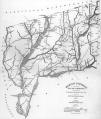|
|
Reference Maps
COUNTY BOUNDARIES
Historic Evolution of Dillon County (Old Upper Marion County)
Five maps illustrating changes in the boundaries of Marion County, from 1710 to 1910. Note that Dillon County
was once part of: the massive Craven County (until 1785); Liberty County; and Marion County (until 1910).
PARISH MAPS 
Throughout the colonial period, the Anglican Church parishes
were also used as local administrative units, similar to modern election districts. The dividing line between
parishes was sometimes altered and you will find petitions by local residents asking that they be allowed to
remain in a former parish. Dillon County straddled the Parishes of Prince Frederick and Prince George.
Anglican Parishes of South Carolina c. 1775
Dillon Townships Map
Modern township map, very useful when researching census records. Please note, however, that
Huggins Township,
carved from lower Manning Township, was not created until 1963.
Old Marion Townships Map
Keep in mind that Dillon was once part of:
- Old Craven County, a massive administrative district, until 1769
- Anglican Parishes of Prince Frederick and Prince George
- 1769-1785 Georgetown District
- 1785-c.1798 Liberty County of Marion District (Liberty is used on 1800 federal census)
- 1798-1868 Marion District
- 1869-1909 Marion County
- 1910 Dillon County was carved from Upper Marion County
For more details, see
County Evolution on the Dillon History page.
HISTORIC MAPS
EXPLORATION - COLONIAL PERIOD:
- Insulae Americana [Visscher 1680] (335k)
Note the territory claimed by France and the territory marked as "Florida"
- Carte ... Caroline [Sanson 1696] (286k)
French; look closely to see land owner names
-
Carte du Mexique... Floride [Delisle 1703] (306k)
The colonies huddled to the east of the Allegheny Mountains are more detailed--
Virginia has company
now with "Carolina". Native American tribes shown.
- Eman. Bowen, 1747 (261.6 kb)
"A New and Accurate, Map of the Provinces of North & South Carolinas, Georgia"
- 1760 Cherokee Nation (90k)
 "A Map of the Province of South Carolina,
with all the Rivers, Creeks, Bays, Inletts, Islands, Inland "A Map of the Province of South Carolina,
with all the Rivers, Creeks, Bays, Inletts, Islands, Inland
Navigation Soundings Time of High Water on the Sea
Coast, Roads, Marshes, Ferrys, Bridges,
Swamps, Parrishes Churches, Towns,
Townships; County Parish Distrrict and Provincial Lines.
Humbly inscribed to the Hon'ble Lawlins Lowndes Esq'r Speaker of the rest of
the Members of the
Hon'ble the Commons House of Assembly of the Province by
their most Obed't of faithfull serv't
Jam's Cook", published 1773. Cook's map is particularly helpful for genealogists in that it shows
not only geographic
features, but also the locations for individual landowners.
Portion of James Cook's 1773 map of South Carolina
REVOLUTION - CIVIL WAR
Entitled "A New and Accurate Map of the Province of
South Carolina in North America", this map, published June 1779
in Universal Magazine
Vol. LXIV June 1779, Pg 281 shows a number of features I have not seen on other maps.
1779 Map of South Carolina
 Thos. Harllee's 1815 map of Marion District, as "improved" for
Mills Atlas, 1825. Another wonderful Thos. Harllee's 1815 map of Marion District, as "improved" for
Mills Atlas, 1825. Another wonderful
resource for researchers, this map shows locations for individual
landowners, meeting houses (churches),
taverns, ferries, etc.
1865 TO PRESENT
 Marion County as shown on an 1895 Rand Atlas map of South Carolina.
You'll find a number of locations Marion County as shown on an 1895 Rand Atlas map of South Carolina.
You'll find a number of locations
on this map that you might not have seen before. Click on the map to
see Marion County.
1895 Map of Marion County
If you'd like to see the
1895 map of the entire state, it's located on
Pam Rietch's web site, which also contains an index
of South Carolina place names. Caution! The full map is
HUGE (about 1.5 MB).
Online Map Collections:
Modern Maps and other Geographic Resources
- MapQuest
If you're traveling to the area and want a highway map with directions you can print out, this is a handy site.
- Maps from the U.S. Census Bureau
Try this one. It allows you to enter a place name and provides locations throughout the U.S. with
zip code,
population data, and a link to a modern map of the locality (Tiger maps from Census Bureau).
- USGS
A great "where is it?" tool.
Geographic locator for United States' towns, cemeteries, rivers, swamps, you name it.
- The TopoZone
If you'd like to explore our area in topographic maps, you'll love this site. Uses USGS topo maps
and you can
select the features you'd like to see marked on a map.
|
